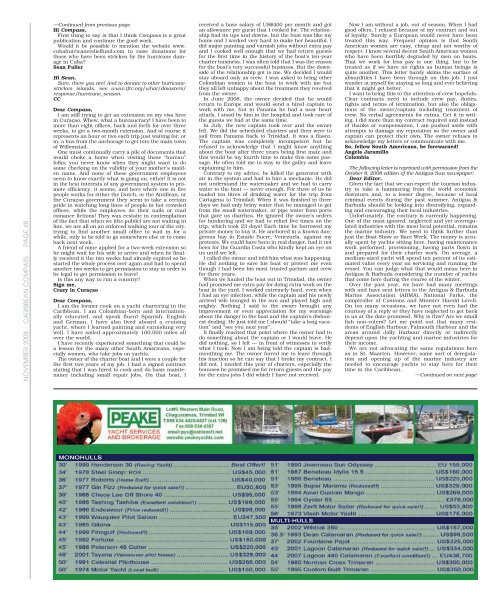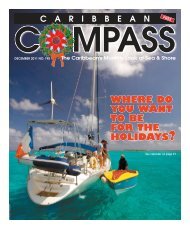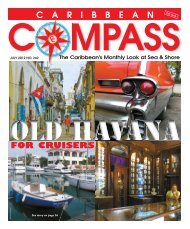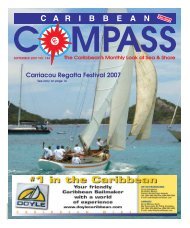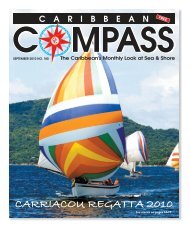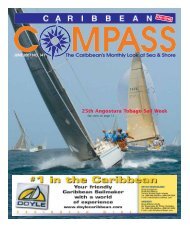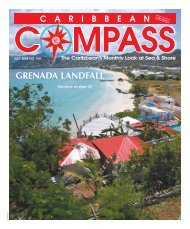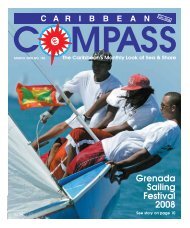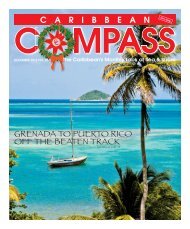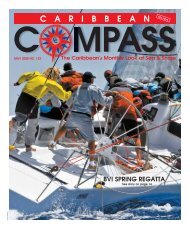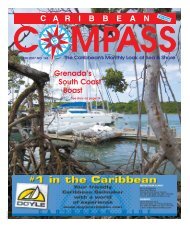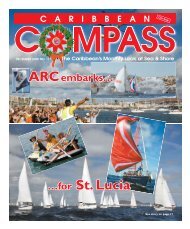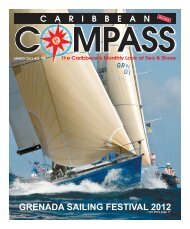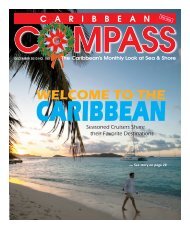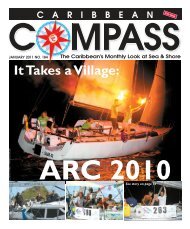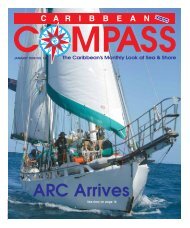A CRUISER'S VIEW OF BEQUIA - Caribbean Compass
A CRUISER'S VIEW OF BEQUIA - Caribbean Compass
A CRUISER'S VIEW OF BEQUIA - Caribbean Compass
You also want an ePaper? Increase the reach of your titles
YUMPU automatically turns print PDFs into web optimized ePapers that Google loves.
NOVEMBER 2008 CARIBBEAN COMPASS PAGE 48<br />
— Continued from previous page<br />
Hi <strong>Compass</strong>,<br />
First thing to say is that I think <strong>Compass</strong> is a great<br />
publication and continue the good work.<br />
Would it be possible to mention the website www.<br />
cubahurricanerelieffund.com to raise donations for<br />
those who have been stricken by the hurricane damage<br />
in Cuba?<br />
Sean Fuller<br />
Hi Sean,<br />
Sure, there you are! And to donate to other hurricanestricken<br />
islands, see www.ifrc.org/what/disasters/<br />
response/hurricane_season.<br />
CC<br />
Dear <strong>Compass</strong>,<br />
I am still trying to get an extension on my visa here<br />
in Curaçao. Whew, what a bureaucracy! I have been to<br />
more than eight offices, back and forth for over three<br />
weeks, to get a two-month extension. And of course it<br />
represents an hour or two each trip just waiting for, or<br />
in, a bus from the anchorage to get into the main town<br />
of Willemstad.<br />
One must continually carry a pile of documents that<br />
would choke a horse when visiting these “bureau”<br />
folks; you never know when they might want to do<br />
some checking on the validity of your mother’s maiden<br />
name. And none of these government employees<br />
seem to know exactly what is going on, either! It is not<br />
in the best interests of any government system to promote<br />
efficiency, it seems, and here where one in five<br />
people works for either the Dutch, or the Antillean, or<br />
the Curaçao government they seem to take a certain<br />
pride in watching long lines of people in hot crowded<br />
offices, while the employees do their nails or read<br />
romance fictions! They wax ecstatic in contemplation<br />
of the fact that when we (the public) are not waiting in<br />
line, we are all on an enforced walking tour of the city,<br />
trying to find another small office to wait in for a<br />
while, only to be told to go somewhere else or to come<br />
back next week.<br />
A friend of mine applied for a two-week extension so<br />
he might wait for his wife to arrive and when he finally<br />
received it the two weeks had already expired so he<br />
started the whole process over again and had to spend<br />
another two weeks to get permission to stay in order to<br />
be legal to get permission to leave!<br />
Is this any way to run a country?<br />
Sign me,<br />
Crazy in Curaçao<br />
Dear <strong>Compass</strong>,<br />
I am the former cook on a yacht chartering in the<br />
<strong>Caribbean</strong>. I am Colombian-born and internationally<br />
educated, and speak fluent Spanish, English<br />
and German. I have also lived aboard a cruising<br />
yacht, where I learned painting and varnishing very<br />
well. I have sailed approximately 100,000 miles all<br />
over the world.<br />
I have recently experienced something that could be<br />
a lesson for the many other South Americans, especially<br />
women, who take jobs on yachts.<br />
The owner of the charter boat and I were a couple for<br />
the first two years of my job. I had a signed contract<br />
stating that I was hired to cook and do basic maintenance<br />
including small repair jobs. On that boat, I<br />
received a base salary of US$400 per month and got<br />
an allowance per guest that I cooked for. The relationship<br />
had its ups and downs, but the boat was like my<br />
home and I worked very hard to make her beautiful. I<br />
did major painting and varnish jobs without extra pay<br />
and I cooked well enough that we had return guests<br />
for the first time in the history of the boat’s ten-year<br />
charter business. I was often told that I was the reason<br />
for the boat’s very successful business. But the downside<br />
of the relationship got to me. We decided I would<br />
stay aboard only as crew. I was asked to bring other<br />
Colombian women to the boat to work with me but<br />
they all left unhappy about the treatment they received<br />
from the owner.<br />
In June 2008, the owner decided that he would<br />
return to Europe and would send a hired captain to<br />
work with me, but in Panama he had a near heart<br />
attack. I stood by him in the hospital and took care of<br />
the guests we had at the same time.<br />
In July, the new captain took over and the owner<br />
left. We did the scheduled charters and then were to<br />
sail from Panama back to Trinidad. It was a fiasco.<br />
The captain was completely incompetent but he<br />
refused to acknowledge that I might know anything<br />
about the boat after three years being first mate and<br />
this would be my fourth time to make this same passage.<br />
He often told me to stay in the galley and leave<br />
captaining to him.<br />
Contrary to my advice, he killed the generator with<br />
air in the system and had to hire a mechanic. He did<br />
not understand the watermaker and we had to carry<br />
water to the boat — never enough. For three of us he<br />
loaded ten litres of drinking water for the trip from<br />
Cartagena to Trinidad. When it was finished in three<br />
days we had only briny water that he managed to get<br />
from the small watermaker, or pipe water from ports<br />
that gave us diarrhea. He ignored the owner’s orders<br />
for bunkering and we had to refuel five times on the<br />
trip, which took 23 days! Each time he borrowed my<br />
private money to buy it. He anchored in a known dangerous<br />
bay in Estado Sucre, Venezuela, against my<br />
protests. We could have been in real danger, had it not<br />
been for the Guardia Costa who kindly kept an eye on<br />
us until we left.<br />
I called the owner and told him what was happening.<br />
He did nothing to save his boat or protect me even<br />
though I had been his most trusted partner and crew<br />
for three years.<br />
When we hauled the boat out in Trinidad, the owner<br />
had promised me extra pay for doing extra work on the<br />
boat in the yard. I worked extremely hard, even when<br />
I had an eye infection, while the captain and his newly<br />
arrived wife lounged in the sun and played high and<br />
mighty. Nothing I said to the owner brought any<br />
improvement or even appreciation for my warnings<br />
about the danger to the boat and the captain’s dishonest<br />
dealing. He just told me I should “take a long vacation”<br />
and “see you next year”.<br />
It finally reached that point where the owner had to<br />
do something about the captain or I would leave. He<br />
did nothing, so I left — in front of witnesses to verify<br />
what I took. Now I am being told the captain is badmouthing<br />
me. The owner forced me to leave through<br />
his inaction so he can say that I broke my contract. I<br />
did not. I needed this year of charters, especially the<br />
bonuses he promised me for return guests and the pay<br />
for the extra jobs I did which I have not received.<br />
Now I am without a job, out of season. When I had<br />
good offers, I refused because of my contract and out<br />
of loyalty. Surely a European would never have been<br />
treated this way. Frequent opinion is that South<br />
American women are easy, cheap and not worthy of<br />
respect. I know several decent South American women<br />
who have been horribly degraded by men on boats.<br />
That we work for less pay is one thing, but to be<br />
treated as if we have no rights as human beings is<br />
quite another. This letter barely skims the surface of<br />
absurdities I have been through on this job. I just<br />
wonder at myself for staying so long and ever believing<br />
that it might get better.<br />
I want to bring this to the attention of crew hopefuls.<br />
Clear contracts need to include crew pay, duties,<br />
rights and terms of termination, but also the obligations<br />
of the owner/captain including treatment of<br />
crew. No verbal agreements for extras. Get it in writing.<br />
I did more than my contract required and instead<br />
of thanks or compensation, I am pushed aside with<br />
attempts to damage my reputation so the owner and<br />
captain can protect their own. The owner refuses to<br />
acknowledge my letters or communicate with me.<br />
So, fellow South Americans, be forewarned!<br />
Angela Jaramillo<br />
Colombia<br />
The following letter is reprinted with permission from the<br />
October 8, 2008 edition of the Antigua Sun newspaper:<br />
Dear Editor,<br />
Given the fact that we can expect the tourism industry<br />
to take a hammering from the world economic<br />
downturn and, to a lesser degree, because of local<br />
criminal events during the past summer, Antigua &<br />
Barbuda should be looking into diversifying, expanding<br />
and encouraging their local industries.<br />
Unfortunately, the contrary is currently happening.<br />
One of the most ignored, neglected and yet overregulated<br />
industries with the most local potential, remains<br />
the marine industry. We need to think further than<br />
just the Boat Show or Race Week. The money is actually<br />
spent by yachts sitting here, having maintenance<br />
work performed, provisioning, having parts flown in<br />
and prepared for their charter work. On average, a<br />
medium-sized yacht will spend ten percent of its estimated<br />
value every year on servicing and running the<br />
vessel. You can judge what that would mean here in<br />
Antigua & Barbuda considering the number of yachts<br />
that come here during the course of the winter.<br />
Over the past year, we have had many meetings<br />
with and have sent letters to the Antigua & Barbuda<br />
Marine Association (ABMA), National Parks, the<br />
comptroller of Customs and Minister Harold Lovell.<br />
On too many occasions, we have not even had the<br />
courtesy of a reply or they have neglected to get back<br />
to us at the date promised. Why is this? Are we small<br />
fish non-voters? Let me point out that many residents<br />
of English Harbour, Falmouth Harbour and the<br />
areas around Jolly Harbour directly or indirectly<br />
depend upon the yachting and marine industries for<br />
their income.<br />
We are not advocating the same regulations here<br />
as in St. Maarten. However, some sort of deregulation<br />
and opening up of the marine industry are<br />
needed to encourage yachts to stay here for their<br />
time in the <strong>Caribbean</strong>.<br />
—Continued on next page


